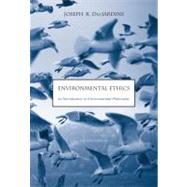Environmental Ethics An Introduction to Environmental Philosophy
, by Des Jardins, Joseph R.- ISBN: 9780534520847 | 0534520847
- Cover: Paperback
- Copyright: 3/23/2005
Part I: BASIC CONCEPTS. 1. Science, Ethics and the Environment. Discussion: Technological Solutions to Environmental Problems. 1.1. Introduction: Why Philosophy? 1.2. Science and Ethics. 1.3. What Is Environmental Ethics? 1.4. Summary and Conclusions. Notes. Discussion Questions. Further Reading. 2. Ethical Theory and the Environment. Discussion. 2.1. Introduction. 2.2. Why Ethical Theory? 2.3. Ethical Relativism. 2.4. The Natural Law Tradition Teleology and Virtues. 2.5. Contemporary Perspectives on Teleology. 2.6. The Utilitarian Tradition. 2.7. Contemporary Perspectives on Utilitarianism. 2.8. Deontology: An Ethics of Duty and Rights. 2.9. Contemporary Perspectives on Deontological Ethics. 2.10. Religious Environmental Ethics. 2.11. Summary and Conclusions. Notes. Discussion Questions. Further Reading. Part II: ENVIRONMENTAL ETHICS AS APPLIED ETHICS. 3. Ethics and Economics: Managing Public Lands. Discussion: Development versus Preservation. 3.1. Introduction. 3.2. Forests: Conservation or Preservation? 3.3. Managing the National Forests. 3.4. Pollution and Economics. 3.5. Ethical Issues in Economic Analysis. 3.6. Cost-Benefit Analysis. 3.7. Ethical Analysis and Environmental Economics. 3.8. Summary and Conclusions. Notes. Discussion Questions. Further Reading. 4. Responsibilities to Future Generations: Sustainable Development. Discussion: Population and Consumption. 4.1 Introduction. 4.2. Population, Consumption, and Environmental Ethics. 4.3. Do We Have Responsibilities to Future Generations? 4.4. What Do We Owe Future Generations? 4.5. Sustainable Development: Economics and Consumption. 4.6. Conclusion: Sustainable Living: Now and in the Future. Notes. Discussion Questions. Further Reading. 5. Responsibilities to the Natural World: From Anthropocentric to Nonanthropocentric Ethics. Discussion: Animal Research and Factory Farming. 5.1. Introduction. 5.2. Moral Standing in the Western Tradition. 5.3. Early Environmental Ethics: Passmore and Blackstone. 5.4. Moral Standing. 5.5. Do Trees Have Standing? 5.6. Peter Singer and the Animal Liberation Movement. 5.7. Tom Regan and Animal Rights. 5.8. Ethical Implications of Animal Welfare. 5.9. Critical Challenges. 5.10. Summary and Conclusions. Notes. Discussion Questions. Further Reading. Part III: THEORIES OF ENVIRONMENTAL ETHICS. 6. Biocentric Ethics and the Inherent Value of Life. Discussion: Biodiversity. 6.1. Introduction. 6.2. Instrumental Value and Intrinsic Value. 6.3. Biocentric Ethics and the Reverence for Life. 6.4. Ethics and Character. 6.5. Taylor''s Biocentric Ethics. 6.6. Practical Implications. 6.7. Challenges and Developments. 6.8. Summary and Conclusions. Notes. Discussion Questions. Further Reading. 7. Wilderness, Ecology, and Ethics. Discussion: Wilderness Management: The Cases of Yellowstone and Boundary Waters Canoe Area Wilderness. 7.1. Introduction. 7.2. The Wilderness Ideal. 7.3. The Wilderness "Myth": The Contemporary Debate. 7.4. From Ecology to Philosophy. 7.5. From Ecology to Ethics. 7.6. Varieties of Holism. 7.7. Summary and Conclusions. Notes. Discussion Questions. Further Reading. 8. The Land Ethic. Discussion: A Place for Predators. 8.1. Introduction. 8.2. The Land Ethic. 8.3. Leopold''s Holism. 8.4. Criticisms of the Land Ethic: Facts and Values. 8.5. Criticisms of the Land Ethic: Holistic Ethics. 8.6. Callicott''s Revisions. 8.7. Summary and Conclusions. Notes. Discussion Questions. Further Reading. 9. Deep Ecology. Discussion: Eco-philosophy as religion. 9.1. Introduction. 9.2. The Deep Ecology Platform. 9.3. Ecology and Ecophilosophy. 9.4. Metaphysical Ecology. 9.5. From Metaphysics to Ethics. 9.6. Self-Realization and Biocentric Equality. 9.7. Criticisms. 9.8. Summary and Conclusions. Notes. Discussion Questions. Further Reading. 10. Environmental Justice and Social Ecology. Discussion: Exporting Toxic Wastes: The World Bank Memo. 10.1. Introduction. 10.2. Theories of Social Justice. 10.3. Property Rights and Justice. 10.4. Environmental Justi







